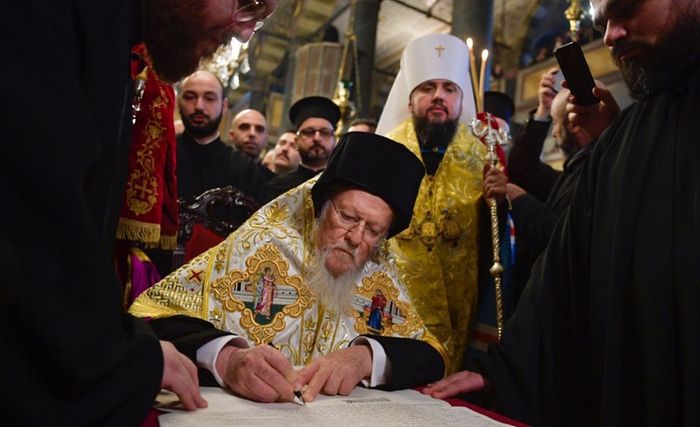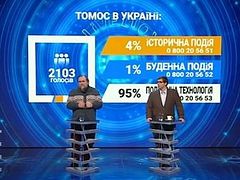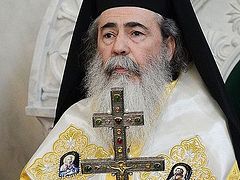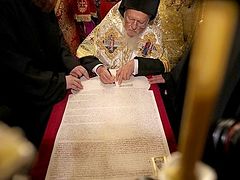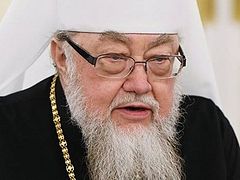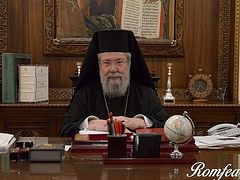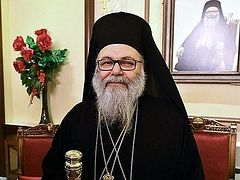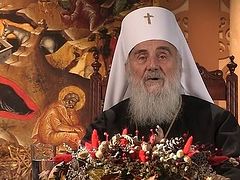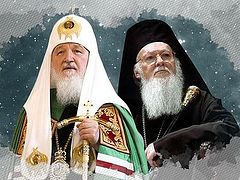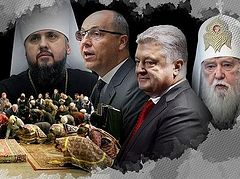Pat. Bartholomew during the ceremony for bestowing the Tomos for Ukraine commented:
“The fullness of time came for the gift of emancipation and independence and self-government free from all external dependence and intervention..."
We are restoring to church unity millions of faithful in your land, who not of their own will, have been beyond canonicity and unity”
There are two questions here to consider. The first is what kind of emancipation is he talking about. The second is did those millions really have no choice and no blame for their condition of being uncanonical and out of unity?
Now it is well known that Pat. Bartholomew did not in fact offer a completely independent ecclesial structure. However, it is interesting that in the letter of Patriarch Bartholomew to Patriarch Alexy in 1995 on the issue of Constantinople receiving into communion the parishes of the Ukrainian Diaspora in America and Canada,1 one of the main things that Pat. Bartholomew sees himself offering is political freedom.
“It is well known that during the Ottoman Empire, the Church of Constantinople, after rather immense jurisdictional expansion, found that in these new times she had to strip herself—certainly this was painful and not pleasant—of her racially closest children, the Hellenes, because she did not want to be an impediment to their further progress toward political freedom.”
<…>
“Responding to the persistent petition of the Estonian Orthodox Church to return to the autonomous status granted her by the Ecumenical Throne in a Patriarchal and Synodal Tome, which unfortunately was forcefully and simultaneously unilaterally abolished when the Soviets deprived the Estonians of political freedom, we are providing a way out of the bitterness borne from the hardships contiguously endured during the tyranical period.”
A careful consideration of the EP’s actions and statements will show that the western values of political freedom are something that he feels he is defending and promoting within the Orthodox Church, through his power of granting autocephaly. In general, throughout the twentieth century, Constantinople is acting upon a dual scenario which supports the western ideas of political freedom while at the same time advocating for an ecclesial dependency wherein Constantinople, after granting autocephaly, continues to have the prerogative to interfere in the internal affairs of the churches it has given a tomos.2
These details I think give us an idea of what kind of emancipation Pat. Bartholomew is referring to in his speech recently. He sees himself as offering the Ukrainian church political and also, I think, cultural freedom. In particular what is offered is a freedom from Russian culture and political influence. But is it the Church’s job to promote one culture over another, or is it the Church’s job to work toward transformation and the harmonization of all nations and cultures?
This East/West cultural prejudice exists on both sides. I have seen Russians point to Pat. Bartholomew’s relationship with the U.S. State department as proof that he is somehow betraying the Church. Western culture is seen as the source of all evil. On the other side people point to Patriarch Kirill’s close relationship with the Russian government as if this is proof of his perfidy and betrayal of the faith. The faithful of the Church have to recognize all of this as simply political rhetoric.
A friend of mine from Ukraine, a fairly new Christian, was debating some politics with her Russian friend in our parish. She brought up a popular story of how a dog was barking in Russia so they muzzled it. The dog didn’t like this and decided to go to Ukraine where dogs had the freedom to bark. A mature Christian friend stepped in at that point and commented, yes, but if the dog wants to be in the Church it has to learn to be quiet and obedient without being muzzled, otherwise it will not be allowed to stay. A particular spiritual principle is at work in the Church that the self-willed person who is not working toward repentance and submission of his freedom and activity to God will either leave the Church on his own, or if he tries to take over and enforce his own will on the Church, will be end up in schism. The Russian emphasis on the need for obedience to authority, and western ideals of freedom are each good in their place and each can go wrong if they become absolutes. What is needed is a free ascetic effort to die to ourselves and rise in Christ—freedom of will is not good in itself apart from submission to God, and forced obedience due to pressure brings about spiritual harm, not good.
The primary accusation against the canonical Ukrainian church is that it is a tool of Russian soft power. What is soft power? Soft power is not coercion or force; it is the ability to shape others’ preferences and beliefs through appeal and attraction. Now while hard power (force, coercion… i.e. soviet tactics) is obviously not Christian, what about soft power? Is this anti-Christian? Hardly; Christ Himself and the Church draws people in through the use of soft power. It is the attraction of a godly life, the preaching of the Gospel, and other means of persuasion and attraction through which people are drawn into the Church and saved.
How then should the Church respond to the use of cultural soft-power? Orthodox history will show us that there is no cultural that is either wholly Christian or wholly pagan or passionate. Each culture has a mix of good and bad. Our missionary fathers teach us that we need to be sensitive to the culture we are preaching in and work to redeem and sanctify it. Back in the late nineteenth and early twentieth centuries we see Americanization, Russianization and Hellenization going on as strong-armed attempts to enculturate those around them. Now in the twentieth century, cultural sensitivity is the ideal, but this has morphed into various cultural minority groups becoming radicalized and forceful in their turn. The Church lives in these changing political realities as resisting passion and sin and encouraging what is good and virtuous and God-oriented.3
Certainly in light of Russia’s actions concerning Ukraine and the political rhetoric it is difficult for the canonical Ukrainian church to remain an autonomous church under the Moscow Patriarchate and have a witness among those Ukrainians who fear Russia and have a prejudice against it. But does this situation justify Constantinople’s unilateral actions?
This brings us around to the second question—are the people in the schismatic church really free from blame? No, they are not. Historically it is clear that they have chosen to join a church that they understood was not canonical. No one forced them to be in a jurisdiction that was recognized by all Orthodox, even Constantinople, as schismatic. No one banned them from attending the canonical Ukrainian church, they chose to reject the official canonical Church as a result of buying into a political agenda that values political and cultural liberation over obedience, patience, faith, love, humility and the other virtues.
The schismatic Ukrainians have consistently shown that political freedom and independence have become an idol. It is understood by our elders and fathers that our thoughts determine our lives, and the whole thought process behind the existence of the schismatic Ukrainian body is not that of spreading the Gospel or bringing in the Kingdom of God, but rather that they wanted political and cultural liberation from Moscow. Political or cultural independence is not bad in itself, but we can tell that something has become an idol in the Christian’s heart when Christian virtue, love, obedience and harmony are sacrificed in order to obtain whatever is desired. This is exactly what has happened in the case of the schismatics. Instead of praying and entrusting their desire for an independent church to God and working toward this with patience and faith, the schismatics decided to take the path of self-will and rebellion. The desire for liberation was not undertaken in a Christian way, but subversion was preferred over canonical methods.4
If I want, for instance, to become a doctor, judge or some other good civil goal there is nothing wrong with this. If however in order to achieve my goal, I start cheating and aggressively trying to weaken others and attack them because I feel that they are getting in my way, then we see that the heart is in the wrong place. Becoming a judge or doctor is no longer a good goal but an idol that is causing moral corruption. It is one thing for Ukraine as a culture or a society to engage in the bid for political freedom or cultural independence; it is another thing entirely for Christians to pursue this goal in a way completely at odds with Christian virtue. This cannot be blessed or legitimized. Constantinople, however, has blessed these political ambitions.
It is the Church’s job to resist what is sinful in a culture or political system and support what is good, fulfilling its job of being a conscience for society. It is wholly unorthodox to bless sinful political ambitions that thrive on a message of hate for another nation or culture. Even the fact that this nation is an enemy does not justify the type of messages that are coming out of the Ukrainian government and the schismatic Orthodox. The Church teaches us to love our enemies, and a message of hate for our enemies cannot be blessed.
The schismatic church was started on the foundation of the idolization of liberty and uncanonical and rebellious tactics in order to achieve their ends. That there is no repentance can be seen in how Met. Epiphany has refused to commemorate the Patriarch of Russia. Clearly this indicates that political freedom is valued more highly than Christ, the Church, or Christian love. Obedience to the ecclesial order is a basic Christian virtue and the only path to salvation. These schismatics have consistently sought autocephaly in ways that image sinful revolutionary ideals rather than in ways that are in line with Christian virtue.
The West likes to preach a gospel of freedom, and in this has promoted the idea that revolution against established authorities is justified. This is enshrined in the American Declaration of Independence. However, from a Christian point of view, freedom is only good inasmuch as it is the freedom to order our lives in obedience to God and the authorities He has set up. At best one can separate from an abusive authority—but in the situation of Ukraine, the modern canonical church is not being called abusive. There are complaints about abuses in the past, but what complaints about Met. Onufry have there been? None of the complaints are about ecclesial abuse;5 all of the complaints are merely political rhetoric against Russia.
That the kind of political “emancipation” Constantinople is supporting is a relative, and not an absolute good can be seen in St Paul’s teaching. In our Western culture, slavery is considered an absolute evil because it takes away individual freedom. St Paul however, does not treat slavery this way. Neither he nor any other church father ever campaigned to overturn the institution of slavery in the Roman Empire. Rather the master was encouraged to be a generous and virtuous master, and the slave was encouraged to be an obedient and willing servant. St Paul recognizes that freedom is a basic natural good, and encourages the slave to win his/her freedom if possible. However, he also sends Onesimus, who was a runaway slave, back to his master Philemon. He does not command Philemon to free Onesimus, he merely hints at this, considering it an act of generosity that goes beyond what is required. Nor does he rebuke Philemon for owning slaves, but wants Philemon to treat his slave as a true brother in Christ. Of course in the situation of the Ukraine we are not even talking about slavery. What kind of oppression were the schismatics suffering? Non-recognition of their canonical status? This was for good reason since they had not gone about seeking what they desired through canonical or Christian means, but through political, unChristian means.
By treating this whole issue as an issue of political freedom rather than ecclesial sin the EP has derailed the process of healing for the schismatics. As Met. Sawa of Poland notes, it is a very serious infraction of the canons for a penalty/epitimia imposed by one spiritual authority (whether it be a spiritual father or a synod) to be lifted by a different authority. For example if a spiritual child falls into a very serious sin and the spiritual father imposes an epitimia of refraining from communing of the Chalice for a period of time; and then the spiritual child goes off to another parish and the epitimia is lifted without anything of its restorative nature being fulfilled- then this is a very serious canonical infraction on the part of the priest who did this. Orthodox spiritual literature teaches that when an epitimia or canonical penalty is imposed it should be fulfilled within the relationship of the person who has the epitimia imposed on him and the spiritual father/hierarch who imposed it. Working out an epitimia within this relationship then becomes part of the healing process. Going elsewhere to escape one's penance is seen as gross self will and disobedience. Basically this adds sin to sin and cuts off the very means God has given to heal things.
This misuse of the canons is not a new problem. Throughout the twentieth century, Constantinople’s scholars and hierarchs have consistently approached the canons in a legal and logical/scientific way rather than in a proper ecclesial way as spiritual medicines.6 The canons themselves cannot be properly used, interpreted, or historically understood apart from the pastoral and spiritual Way reflected in the lives and spiritual writings of the saints. It is an unfortunate problem that the hierarchs supporting Constantinople have taken an approach to the canons modeled on Scholastic or modern historical/analytical methodologies rather than Orthodox wisdom. Constantinople’s canon law specialists have tended to ignore the fact that there needs to be a free ascetic effort made in order to heal schism, and that the canons are to be used to help this effort, not as a legal tool to merely create institutional unity. The Church is not an institution; it is a divine/human body which is in a free spiritual movement toward the Kingdom of God. This Kingdom does not consist in political freedom or institutional order, but in a dispassionate state wherein there is spiritual freedom and divine order. The divine administration of the Church is always establishing this kind of order and movement, not material or political order.
A major tragedy in this whole scenario is that Constantinople’s actions have given the schismatics a sense of cultural “freedom”, which, while being freedom from Russia, is really simply bondage to their passions. They have blessed the motto of “liberation from Russia” and disparaged the God-given means toward spiritual healing, freedom and Christian love.

